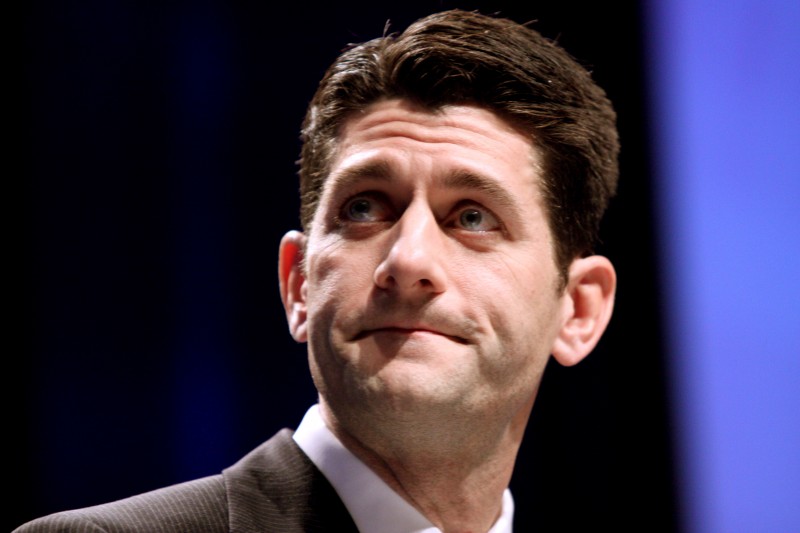Views expressed in opinion columns are the author’s own.
I used to love Paul Ryan. We rarely agreed on policy, and our objectives were routinely at odds. But there was something about him, with his charts, starched shirts and wonky vigor that charmed me. Over the past year, this all changed. This column is an elegy to the Paul Ryan I thought I knew — the misguided but earnest wonk, the tribune of intellectual conservatism — and a lamentation of what he’s become.
My one-sided relationship with Ryan began when I was in 10th grade, when I was in the throes of my wonky phase. Graphs, charts and data engrossed me. I spent hours investigating the nitty-gritty mechanics of credit default and researching the merits of replacing a minimum wage hike with a more robust earned income tax credit. I wore button-down shirts a lot. In response to the budget crises of the time, I maintained that Congress could get working again if it only adjusted its hyper-partisan posture and received the unsexy wisdom of technocratic truth.
Enter Paul Ryan: the blue-eyed and widow’s-peaked young congressman from Janesville, Wisconsin. In my post-partisan pipe dream, Ryan was the Republican Party’s only hope. If he could wrest power from the GOP’s demagogues, conservatism would be more thoughtful, data-driven and, ultimately, compassionate. Washington reporters cranked out fawning stories about Ryan staying up late in his office, poring over spreadsheets, and I gobbled it up. He and my favorite liberal wonk, Ezra Klein, had a good relationship, prompting me to fantasize about a Klein-Ryan presidential ticket. Surely, with the assistance of a few charts, Klein and Ryan could cut through partisan nonsense and set policy based on data and reason.
I was thrilled when Ryan was elected Speaker of the House. I thought that his takeover of the Republican Party was almost complete. Donald Trump was a passing annoyance who would surely self-destruct. After Trump’s inevitable collapse, I assumed compassionate technocracy would be the ruling ideology of the GOP. But, of course, the Trump train kept on chugging to the White House. And instead of wresting power from Republican demagoguery, Ryan acceded to it. The 2016 election was a moral test for him. His political cowardice guaranteed failure.
After Trump wrapped up the Republican primary, Ryan didn’t commit to supporting him. But, after weeks of hand-wringing, he endorsed Trump. When Trump explained that a Mexican-American judge shouldn’t hear a case to which Trump was a party, Ryan stood firm in his convictions; that’s the textbook definition of racism, he declared. But still, he reaffirmed his support for Trump. Ryan was offended by Trump’s proposed Muslim ban. But did this change Ryan’s decision to endorse him? Of course not. When Trump was caught on tape bragging about sexually assaulting women, Ryan couldn’t handle it anymore. He was “sickened” and insisted that he wouldn’t campaign with or defend Trump anymore. However, in the days leading up to the election, Ryan offered to campaign with his party’s nominee.
My love for Ryan was driven by one faulty assumption: I thought wonkery could be a governing ideology. In reality, the wonk’s tools — math, data and reason — are just tools. Tools can be used for good or ill, governed by the wonk’s values. Ryan’s morals were tested in 2016 and, like trees in Trump’s America, they fell, one by one. His self-professed faith in pluralism, liberty and fiscal conservatism couldn’t stand the test of Trump.
In the soul of Paul Ryan, alongside the scattered remains of his discarded values, one principle stands proudly undamaged. He maintained his support for Trump because his political career echoes a belief of one of his favorite authors, Ayn Rand, that wealthy people are marked by their success as worthier than others. Now that Trump has won, Ryan can get to work cutting taxes on millionaires and billionaires, paid for by cuts to services for poor people. He got what he wanted.
I wish this weren’t the case. For years, I was as ardent a Paul Ryan apologist as they come. But Ryan has sacrificed country for ideology. He joins those cowards who accede to authoritarianism, despite knowing better. I can love and respect him no more.
Max Foley-Keene is a freshman government and politics major. He can be reached at maxfkcap2016@gmail.com.



